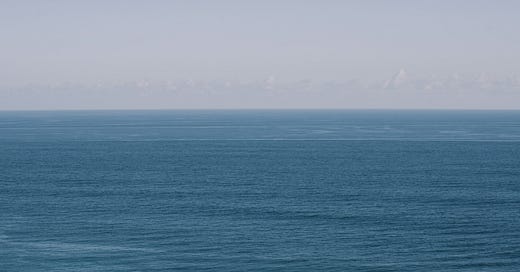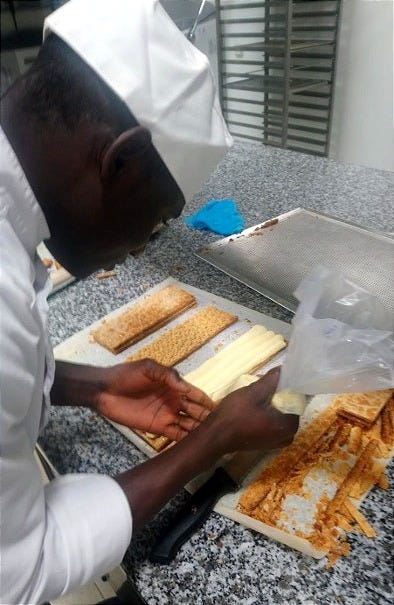Find this article and other resources on migration on Chiche, media by makesense.
To read the French version:
At the age of 15, Banta made the most difficult decision of his life: to leave his native Mali. A country he loved, but where his future seemed uncertain. After a perilous six-day crossing of the Atlantic Ocean, he set foot in Europe, on unfamiliar soil. Three years later, the young man, barely an adult, hasn't forgotten this arduous journey, but he looks to the future with his eyes full of dreams.
“It's only now that I realize what I've been through. I wasn't afraid while it was happening”, confides the young man as he attempts to retrace his difficult journey to France. Banta Gassama grew up without a father, and left Mali on his own as a teenager. His mother didn't try to dissuade him when she learned of his plans to leave.
“When I called my mother to tell her I was going to Mauritania, she immediately understood that I was going to try to cross the sea to Europe.” He pauses, weighing the weight of his words. “She accepted my decision. If she'd said no, I might have given up,” says the young man, now 18.
A journey fraught with setbacks
Banta's journey began with a long journey across West Africa, from Senegal to Mauritania. Along the way, he discovered a frightening reality: many migrants were losing their lives before even reaching the coast. But fear didn't stop him.
Banta was arrested by Mauritanian forces for being in the country illegally; he was eventually released and allowed to continue on his way. “I wanted to give up several times. But when the agents released me, I thought I might have a chance,” confides Banta. He met a young Senegalese man who spoke French and helped him communicate throughout the journey.
Irregular crossings and incidents multiplied along the West African coast in 2024. According to the International Organization for Migration (IOM), between January and March of 2024, 12 shipwrecks were identified along West Africa's Atlantic route, and 119 migrants died or disappeared during this period. These shipwrecks occurred mainly off the Canary Islands, Morocco, Cape Verde and Senegal.
The long crossing
There are many ways to reach Europe. Some migrants, in exchange for a large sum of money, manage to obtain a visa. However, Banta, from an impoverished family, didn't have the means to obtain one. If he wanted to leave, his only option was the dangerous and difficult route. After several land crossings, he boarded a pirogue with around a hundred other people, through the West-Atlantic route. For Banta, this was the final stretch before reaching Europe.
“The children are taken on board first, then the others climb on. At this point, no one is allowed to speak. You're not supposed to say anything until you arrive,” he explains. The pirogues set sail laden with water and food, bound for the Canary Islands, the gateway to Europe. Crossing the Atlantic Ocean is particularly dangerous, requiring at least a week of sailing. Banta spent six days at sea. “When you're in this small boat, everyone gets down to work, because you have to continually drain the water that enters the pirogue”, explains the young man. According to him, this is one of the main reasons why these leaky boats sink before reaching their destination.
“It's a painful crossing. At one point, some people in the pirogue started to panic. We saw death in the face. This journey is not easy at all... it's not easy at all.”
“I can dream now”
Arriving in Perpignan in February 2022, on the border between Spain and France, Banta benefited from the generosity of a stranger who offered him a bus ticket to Paris. His arrival in the capital was a shock. Left to his own devices, with no bearings in the city of light, he turned to the Red Cross.
Temporarily housed, he soon had to leave the center and spent two nights sleeping in the streets. “They asked me questions about how I got to France, and I explained. I don't think they were convinced,” he says.
Along with other young people temporarily housed by the Red Cross, he got in touch with the association La Timmy [Team for Exiled Minors] which specializes in supporting unaccompanied minors.
This association, which brings together volunteer families, enabled him to stay with host families. La Timmy helped him with administrative, legal and medical formalities, and provided him with material and psychological support. After much effort, Banta was able to learn to read and write in French, an essential step towards integration.
Today, he is training to become a baker and is preparing a CAP in Pastry and Bakery. Passionate about this art since his childhood in Mali, he has an ambitious dream for the years to come: to open his own patisserie in France.
For him, it's much more than just a professional project. It's a way for him to put down roots in the country that welcomed him, to share his experiences and, in turn, to offer a little sweetness to those who cross his path.
Haitian journalist, Jean Samuel Mentor worked as a reporter-editor in several online and radio media houses. In 2021, he was awarded a Young Journalist Prize by the International Organization of Francophonie.
In early 2023, while editor-in-chief of Haiti News 2000, he began investigating private security companies and illegal arms trafficking in Haiti, and received numerous death threats.
He was forced to leave his country at the end of 2023 for France, where he won 3rd place in the Bayeux Calvados-Normandie War Correspondents' prize in the radio category for his report “Haiti: women’s bodies, a battleground for gang violence”.






